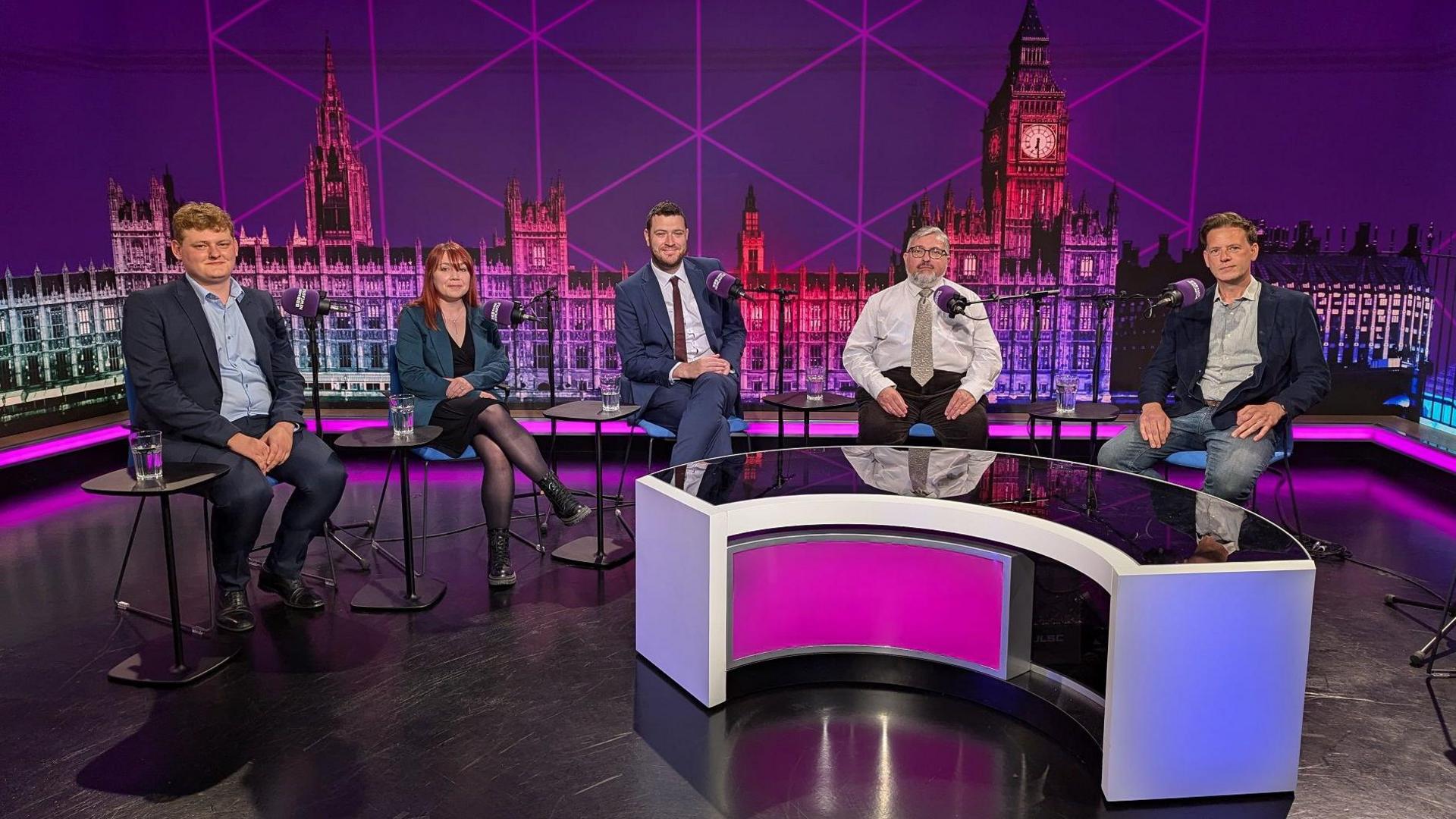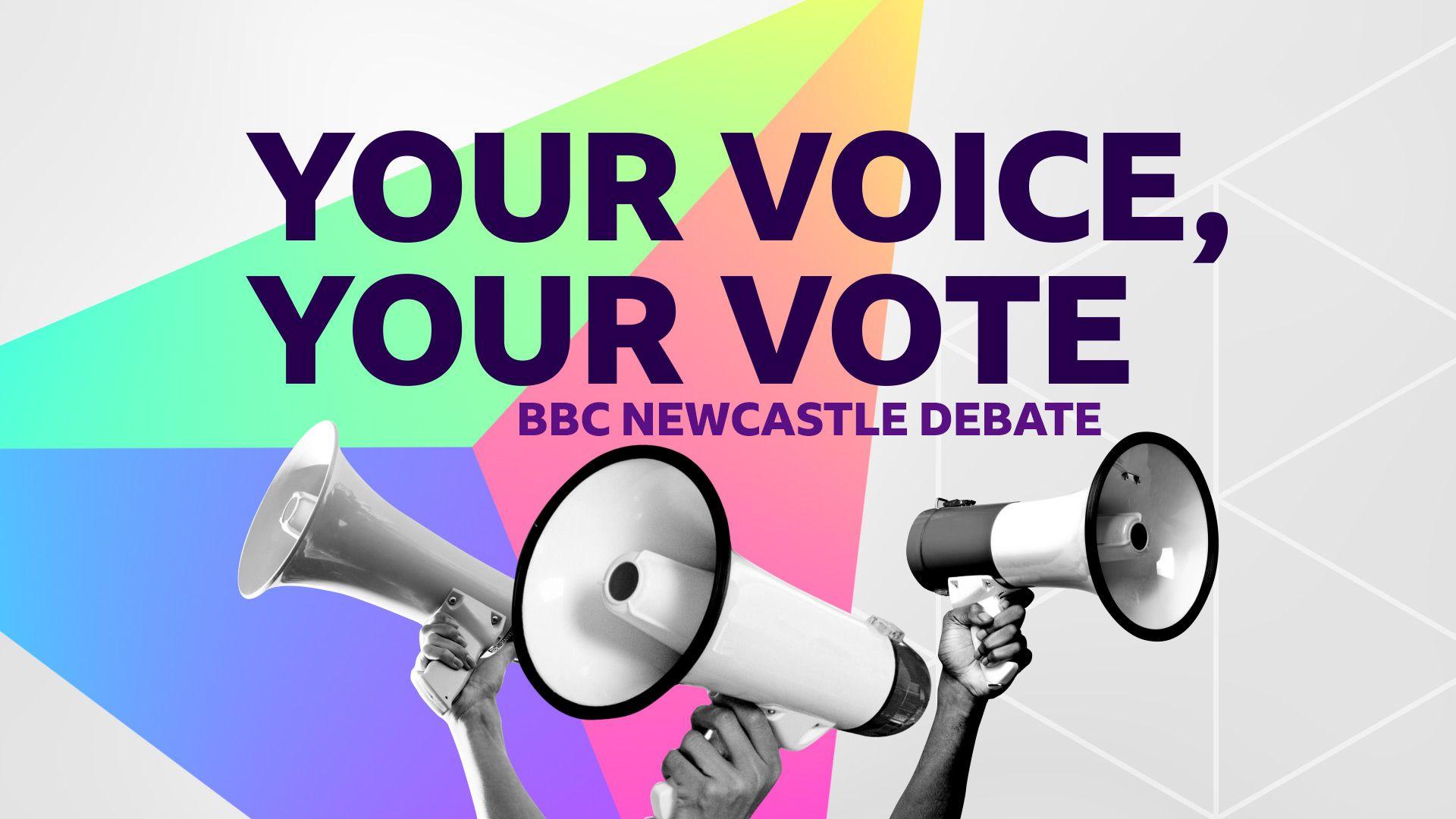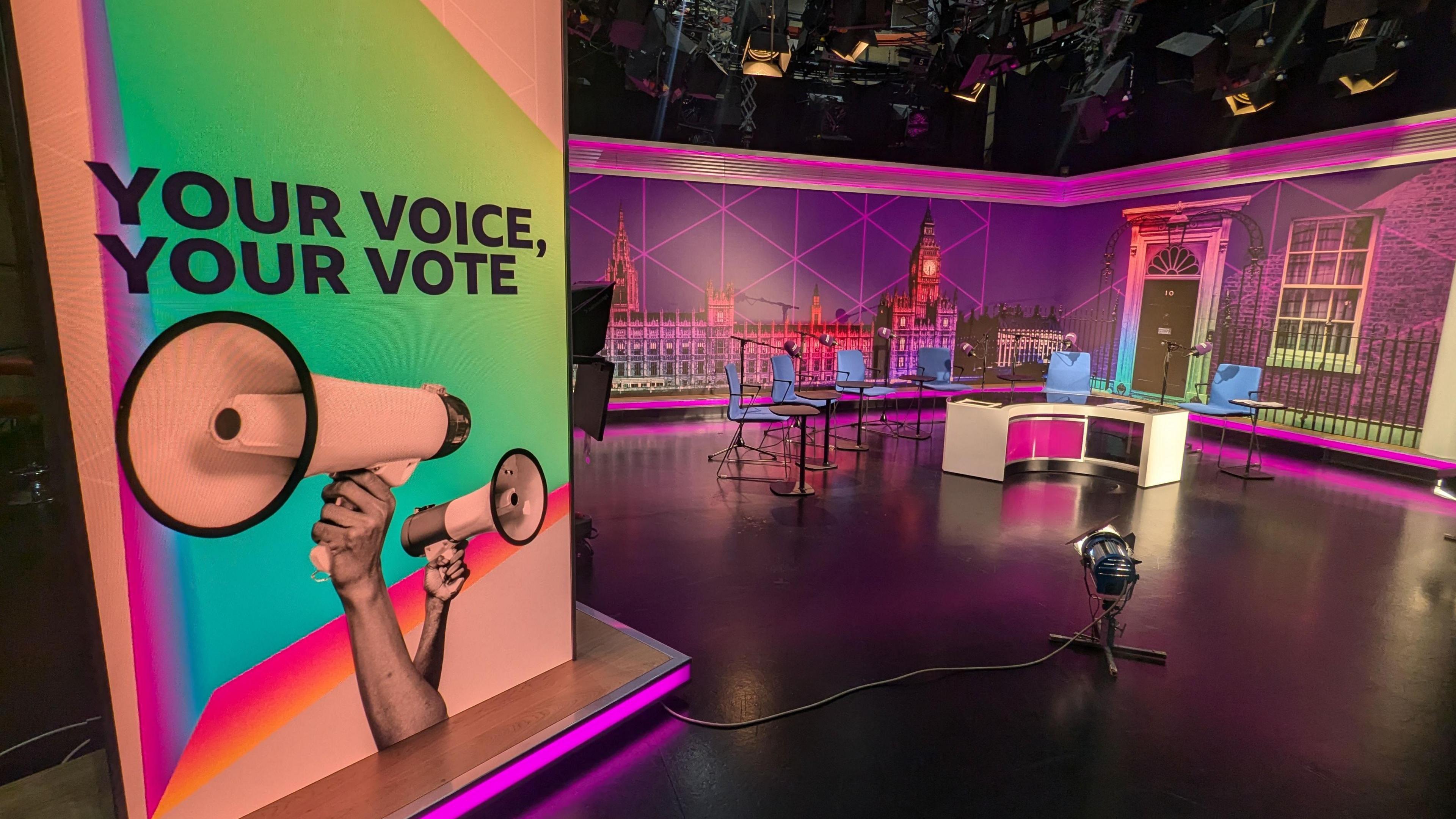Seven takeaways from BBC Newcastle's election debate

Candidates from five political parties took part in Tuesday's BBC Newcastle election debate
- Published
Poverty, public transport and sewage in the River Tyne were all key issues discussed when five candidates from across the BBC Newcastle area took part in the Your Voice, Your Vote general election debate.
Chaired by BBC North East and Cumbria's political editor Richard Moss, listeners’ questions were put directly to politicians from the main parties live in the studio.
Among the sparkiest exchanges was a clash between Conservative Luke Allan Holmes and Labour’s Joe Morris over the issue of poverty.
The Conservative said his government had protected households and incomes - and boosted communities with levelling up cash. Labour said there had been a lack of investment in public services for 14 years.
Reform UK’s Andrew Husband said his party would lift the tax-free income to £20,000, bringing seven million people out of poverty instantly.
The Greens’ Rachel Featherstone said they would invest in home insultation to cut fuel bills and bring in a minimum wage of £15 per hour.
Liberal Democrat Ron Beadle said the government should be ashamed of its record of increasing poverty, and his party would abolish the two-child benefit cap and offer free school meals to all primary school children.
The tone of the debate was passionate without being aggressive. So what did we learn? Here are seven takeaways.
1. All accept the NHS can't be fixed quickly
Ron Beadle highlighted the Lib Dems' manifesto promise that cancer patients be seen within 62 days, adding: "As a cancer patient myself I know how important this is."
Reform UK’s Andrew Husband said one of the biggest issues was staff retention - and its policies around tax breaks for NHS workers earnings would help.
Labour’s Joe Morris insisted his party would be able to deliver an extra 40,000 GP appointments a week. He said: "We need to start by getting the NHS back on its feet. Our manifesto is what we can achieve in five years."
Conservative Luke Allan Holmes praised our doctors and nurses for their work during the pandemic and in the time since.
He outlined the party’s commitment to the NHS Long Term Plan, adding: "We haven’t met out targets over the past few years because of Covid but we have invested a lot of money in the NHS."
The Greens’ Rachel Featherstone said simply "other parties don’t plan to invest enough". She argued they could - with "a modest tax on the super-rich."
2. Crumbling schools have become an election issue
Thousands of North East pupils had their studies disrupted after so-called crumbing concrete used in school buildings - known as Raac - was judged unsafe.
And there were already complaints that too many schools were left with outdated, leaky and poorly insulated structures.
The question of who was to blame divides the parties.
Labour said the government has under-invested in schools for many years, but the government insists it has been rebuilding and improving schools across the region.
As for the problems caused by Raac at St Leonard’s School in Durham – raised by a listener - Conservative Luke Allan Holmes said Tory councillors and ministers had pushed hard to ensure pupils were able to move to temporary buildings to limit disruption.
3. A light at the end of the tunnel for public transport
The parties all believe there will be improvements – as local leaders have been granted more powers to make changes with the North East mayoral authority.
Conservative Luke Allan Holmes argued that cancelling HS2 means more money for transport projects across the North, and pointed to the new Northumberland Line. He said public transport is "one thing we are well on top of".
Rachel Featherstone for the Greens said more money needed to be invested to make it "more reliable and frequent, and more attractive than the car".
Liberal Democrat Ron Beadle blamed privatisation for transport problems in the North East, and expressed hope the new mayoral authority will have the power to make changes.
Reform UK’s Andrew Husband argued that scrapping HS2 is an "easy fix" to allocate the money elsewhere.
And for Labour, Joe Morris said it would make it easier for communities to have input into their bus routes. He pointed out Kim McGuinness, Labour's mayor for the North East, wanted to bring in more integrated transport and will have an easier time doing so with a Labour government.

4. Like a river - water divides
The parties disagreed on how to improve water quality in our rivers.
Labour, the Liberal Democrats and the Conservatives ruled out nationalising water companies due to costs.
However, Rachel Featherstone of the Green Party said it would take water companies back into public hands, adding we should not be giving them "a single penny more".
Andrew Husband, for Reform UK, said it would bring water companies 50% back into public ownership, and "the profits should go back into the taxpayers’ pockets".
Liberal Democrat Ron Beadle said water firms would be changed into "public benefit companies" and it would replace and "toughen up" the regulator.
5. There is room for co-operation
While the parties may disagree on many topics, there were areas of consensus.
On the issue of social care, all parties accept more investment is needed.
Liberal Democrat Ron Beadle said: "This is where the Lib Dems and Reform UK agree - it needs to not be a party political issue."
Rachel Featherstone for the Greens added "in the spirit of co-operation" it agreed with the Lib Dems’ plan on personal care, adding "we are committed to providing enough money for that".

Voters go to the polls on 4 July in the UK general election
6. Brexit - the elephant in the room
Eight years after the EU referendum, the politicians were asked whether Brexit has been a success or not.
Reform UK’s Andrew Husband said people are blaming things on Brexit rather than a three-year pandemic, but argued Brexit had not "stopped" people from working or studying in Europe.
Conservative Luke Allan Holmes said Brexit has been a huge success, adding: "We are now back in charge of the United Kingdom and we’re not surrendering to Brussels."
Joe Morris for Labour said Brexit has damaged sheep farmers in Northumberland, adding: "We need to get on a better standing so that farmers... can get on a better footing with trading with the EU."
Green Rachel Featherstone proudly declared the party's "pro-EU" credentials, adding it would look to re-join "as soon as possible".
Liberal Democrat Ron Beadle said Brexit had left international student numbers in Gateshead and Newcastle "plummeting" - and added it was "committed" to restoring the UK's relationship with the EU because "stopping people coming massively impacts our influence in the world".
7. Other parties are available
The BBC Newcastle Your Voice, Your Vote debate included the five biggest parties who are likely to receive the most support at the general election, but there are others to choose from.
Many of the 20 constituencies in the BBC Newcastle area will see independent candidates on the ballot papers. The Social Democratic Party is standing in eight areas, and some constituencies will also have candidates from the Workers Party of Britain and the Party of Women, to name just a few.
A full list of candidates standing in the general election is available here
Follow BBC North East on X (formerly Twitter), external, Facebook, external and Instagram, external. Send your story ideas to northeastandcumbria@bbc.co.uk.


